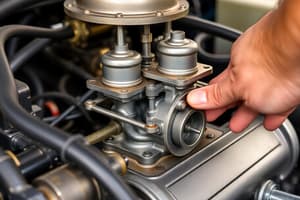Podcast
Questions and Answers
What is one of the primary roles of diagnostic tools in automotive maintenance?
What is one of the primary roles of diagnostic tools in automotive maintenance?
- To charge refrigerant in air conditioning systems
- To enable diagnostic testing of vehicle systems (correct)
- To conduct vehicle inspections
- To perform engine lifts
Which type of brake system utilizes brake pads and is commonly found in modern vehicles?
Which type of brake system utilizes brake pads and is commonly found in modern vehicles?
- Drum brake system
- Hydraulic brake system
- Disc brake system (correct)
- Pneumatic brake system
What educational path focuses specifically on practical experience under a qualified mechanic?
What educational path focuses specifically on practical experience under a qualified mechanic?
- Apprenticeships (correct)
- Community colleges
- Formal degree programs
- Trade schools
What is a key responsibility of automotive mechanics when diagnosing vehicles?
What is a key responsibility of automotive mechanics when diagnosing vehicles?
Which of the following is a significant factor for mechanics to maintain career advancement?
Which of the following is a significant factor for mechanics to maintain career advancement?
Which type of mechanic specializes in diesel engine repair?
Which type of mechanic specializes in diesel engine repair?
What tool is commonly used to analyze the performance of a vehicle's electrical systems?
What tool is commonly used to analyze the performance of a vehicle's electrical systems?
Which of the following skills is NOT considered essential for an automotive mechanic?
Which of the following skills is NOT considered essential for an automotive mechanic?
What aspect of modern vehicles necessitates a deep understanding from mechanics?
What aspect of modern vehicles necessitates a deep understanding from mechanics?
What is the focus of collision repair mechanics?
What is the focus of collision repair mechanics?
Flashcards
Who are automotive mechanics?
Who are automotive mechanics?
Automotive mechanics diagnose, repair, and maintain various types of vehicles, combining mechanical, electrical, and sometimes computer-based knowledge.
What are diagnostic skills?
What are diagnostic skills?
Identifying the source of problems in a car using different tools.
What is mechanical aptitude?
What is mechanical aptitude?
Understanding how different parts of a car work together.
What do Diesel mechanics do?
What do Diesel mechanics do?
Signup and view all the flashcards
What do Collision repair mechanics do?
What do Collision repair mechanics do?
Signup and view all the flashcards
Hydraulic Brakes
Hydraulic Brakes
Signup and view all the flashcards
Suspension System
Suspension System
Signup and view all the flashcards
Exhaust System
Exhaust System
Signup and view all the flashcards
Cooling System
Cooling System
Signup and view all the flashcards
Power Steering System
Power Steering System
Signup and view all the flashcards
Study Notes
Automotive Mechanics: Overview
- Automotive mechanics are skilled technicians who diagnose, repair, and maintain various types of vehicles.
- Their work combines mechanical, electrical, and sometimes computer-based knowledge.
- Essential tasks include inspecting vehicles, identifying problems, performing repairs and part replacements, and ensuring safety standards.
- Work includes preventative maintenance and troubleshooting complex mechanical issues.
- Modern mechanics require a deep understanding of electronic control systems.
Key Skills and Responsibilities
- Diagnostic skills: Using diagnostic tools to identify malfunction sources.
- Mechanical aptitude: Understanding how vehicle systems interact.
- Troubleshooting ability: Analyzing issues and finding effective solutions.
- Technical expertise: Correctly using tools and following repair procedures.
- Safety awareness: Adhering to safety regulations and procedures.
- Communication skills: Effectively communicating with customers and colleagues.
- Problem-solving: Addressing technical issues individually and as a team.
- Detail-oriented: Accurately documenting repairs and following manufacturer specifications.
- Customer service skills: Building rapport with clients and explaining repairs.
- Adaptability: Keeping up with automotive technology advancements.
Types of Automotive Mechanics
- General mechanics: Repair all vehicle types, covering many systems.
- Specialty mechanics: Focus on specific vehicle systems (e.g., engine, transmission, electrical).
- Diesel mechanics: Specializing in diesel engine repair.
- Hybrid and electric vehicle mechanics: Knowledgeable about battery systems, electric motors, and internal combustion engines.
- Collision repair mechanics: Repair accident-damaged vehicles, focusing on metalwork and body adjustments.
Common Vehicle Systems and Components
- Engine systems: Combustion engines, fuel injection, and electrical systems.
- Transmission: Manual and automatic transmissions, fluid changes.
- Electrical systems: Wiring, battery, ignition, and electrical diagrams.
- Brakes: Hydraulic, drum, and disc systems, brake pad replacements.
- Suspension and Steering: Understanding suspension mechanisms, steering components, and their interactions.
- Exhaust system: Maintenance, leak diagnosis, and performance issues.
- Cooling system: Maintaining coolant systems and engine temperatures.
- Steering systems: Power steering systems and maintenance.
- Air conditioning systems: Refrigerant charging, evaporator, compressor analysis.
Tools and Equipment
- Diagnostic tools: Scanners, voltmeters, oscilloscopes, and torque wrenches.
- Hand tools: Pliers, screwdrivers, wrenches, and sockets.
- Specialized tools: Engine lifts, tire changers, wheel alignment tools.
- Vehicle-specific equipment: Equipment may differ by vehicle and component.
Educational Paths
- Apprenticeships: Gaining practical experience under a qualified mechanic.
- Trade schools: Focused training and certification in automotive mechanics.
- Community Colleges: Associate's degrees or certificates in automotive technology.
- Formal Degree programs: Bachelor's degrees in automotive technology.
Career Outlook and Advancement
- Mechanics are in demand due to ongoing vehicle maintenance needs.
- Advancement opportunities include supervisory roles, specialization, or opening a repair shop.
- Staying updated on technologies and techniques is crucial.
Studying That Suits You
Use AI to generate personalized quizzes and flashcards to suit your learning preferences.




